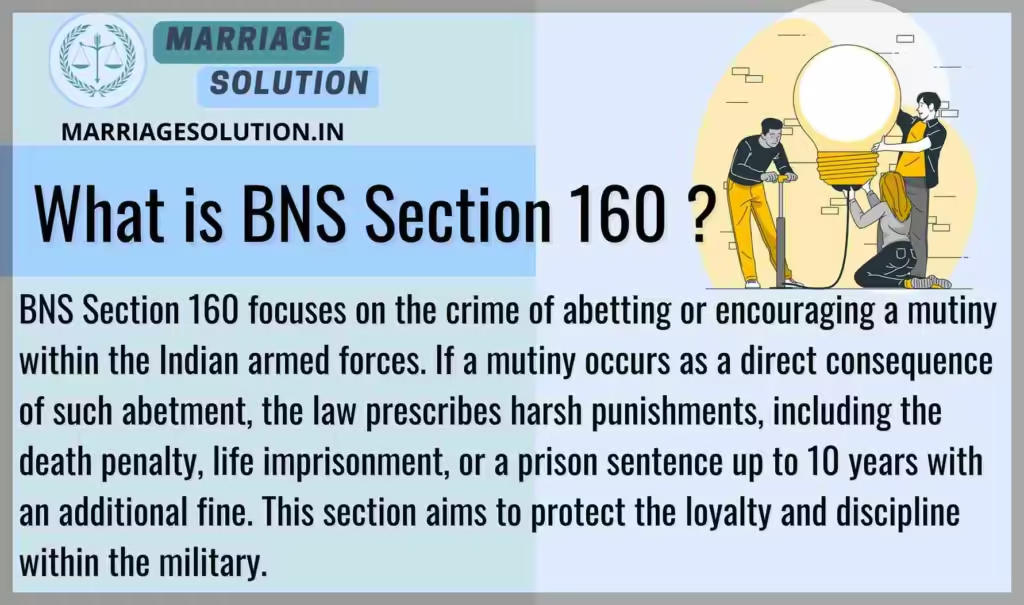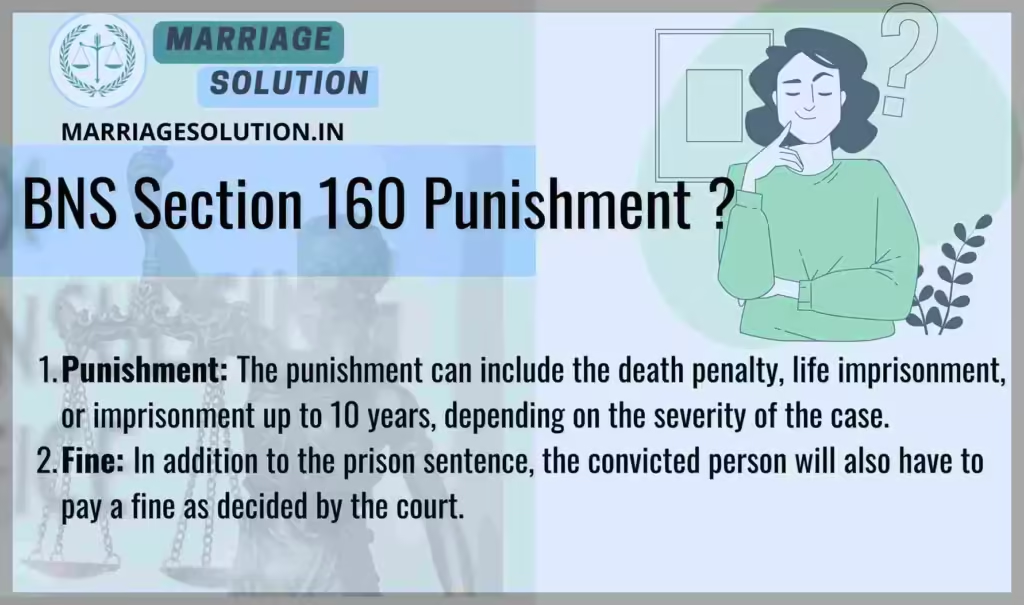Introduction of Section 160 BNS
160 BNS of the Bharatiya Nyaya Sanhita deals with the serious crime of encouraging or supporting (abetting) a mutiny by military personnel, such as officers, soldiers, sailors, or airmen. If a mutiny actually takes place as a result of such abetment, the person responsible for encouraging it can face severe punishments, including the death penalty, life imprisonment, or a prison term up to 10 years along with a fine.
The Bharatiya Nyaya Sanhita (BNS) Section 160 replaces the old Indian Penal Code (IPC) Section 132.
What is BNS Section 160 ?
BNS Section 160 focuses on the crime of abetting or encouraging a mutiny within the Indian armed forces. If a mutiny occurs as a direct consequence of such abetment, the law prescribes harsh punishments, including the death penalty, life imprisonment, or a prison sentence up to 10 years with an additional fine. This section aims to protect the loyalty and discipline within the military.

Abetment of mutiny BNS 160
Whoever abets the committing of mutiny by an officer, soldier, sailor, or airman, in the Army, Navy, or Air Force of the Union of India, shall, if mutiny is committed in consequence of that abetment, be punished with death, or with imprisonment for life, or with imprisonment for a term which may extend to ten years, and shall also be liable to fine.
1. Meaning of “Abetment of Mutiny”
Abetment means encouraging, aiding, or instigating a soldier, sailor, or airman to revolt against lawful authority.
- This can include giving advice, providing weapons, spreading propaganda, or directly telling them to disobey orders.
- However, for Section 160 to apply, the mutiny must actually take place because of the abetment.
2. Difference from Section 159
- Section 159 punishes attempts to seduce soldiers from duty or loyalty, even if mutiny does not occur.
- Section 160 is stricter because here mutiny actually happens due to the abetment.
3. Punishment
- Death penalty → for the most serious cases.
- Life imprisonment → alternative for grave cases.
- Up to 10 years’ imprisonment → in less severe cases.
- Fine → added by the court depending on circumstances.
This shows that abetting mutiny is treated on par with crimes like waging war against the nation.
4. Key Elements of the Offense
- There must be an act of abetment (encouraging, instigating, aiding).
- The abetment must target soldiers, sailors, or airmen of the Indian armed forces.
- Mutiny must actually occur as a direct result of the abetment.
- The accused must have intention or knowledge that their actions may lead to rebellion.
5. Nature of the Offense
- Cognizable → Police can arrest without a warrant.
- Non-bailable → Bail is not easily available due to the gravity of the offense.
- Non-compoundable → Cannot be settled privately, must go to trial.
- Triable by Court of Session → Because of its seriousness.
Examples of BNS Section 160
Example 1: Direct Incitement
A civilian tells a group of soldiers to disobey their commander and attack a military base. The soldiers actually mutiny and act upon it. The civilian is guilty under BNS 160.
Example 2: Providing Support for Mutiny
An airman provides weapons and logistics to fellow airmen to revolt against their officers. The mutiny occurs, so he is punishable under Section 160.
Why BNS Section 160 is Important
- Protects the discipline and loyalty of the armed forces.
- Ensures that no person can influence soldiers to betray their duty.
- Prevents rebellion within the military, which could endanger national security.
- Acts as a deterrent with its extreme punishments (including the death penalty).
Section 160 BNS Overview
BNS Section 160 is about the crime of encouraging or helping a mutiny by soldiers, sailors, or airmen in the Indian armed forces. If a mutiny happens because of someone’s encouragement, that person can be severely punished with the death penalty, life imprisonment, or imprisonment for up to 10 years, along with a fine.
BNS Section 160: 10 Key Points
- Definition of Mutiny Abetment
- BNS Section 160 applies when someone helps or encourages soldiers, sailors, or airmen in the Indian Armed Forces to revolt or commit mutiny. The law is specifically for those who promote or incite such rebellious acts.
- Mutiny Must Occur as a Result of Abetment
- For this section to apply, the mutiny or rebellion must actually take place because of the encouragement or help given by the person. If no mutiny happens, this specific section does not apply.
- Death Penalty for Serious Cases
- If the mutiny is serious and dangerous, the person who helped or incited it can be sentenced to death. This is the harshest punishment under this section.
- Life Imprisonment as an Alternative
- If the court does not impose the death penalty, it can still sentence the guilty person to life imprisonment. This means they may stay in jail for the rest of their life.
- Imprisonment for 10 Years in Less Severe Cases
- If the court finds the case less severe, it can sentence the guilty person to a prison term of up to 10 years. This is usually for less dangerous cases of mutiny.
- Liability to Fine
- Along with the prison sentence, the person may also have to pay a fine. The fine is an additional punishment, and the amount is decided by the court based on the case.
- Cognizable Offense
- This means the crime is considered very serious, and the police can arrest the person without needing a warrant. The police can begin an investigation immediately if they suspect someone of abetting mutiny.
- Non-Bailable Offense
- Because of the seriousness of this crime, it is non-bailable. This means the person accused of the crime cannot easily get bail and may have to remain in jail until the trial concludes.
- Tried in the Court of Session
- Cases under BNS Section 160 are heard by a Court of Session, which is a higher-level court. The seriousness of the crime requires it to be handled at this higher judicial level, where stronger penalties can be imposed.
- Maintaining Discipline in Armed Forces
- The purpose of this law is to protect discipline and loyalty in the Indian Armed Forces. It aims to ensure that soldiers, sailors, and airmen remain committed to their duties and do not get involved in rebellious acts against the government.
Examples of BNS Section 160
- Example 1: Encouraging Soldiers to Rebel
- A person secretly tells a group of soldiers to rebel against their commander. Because of this person’s influence, the soldiers plan and start a mutiny. Under BNS Section 160, the person who encouraged the mutiny can be punished with life imprisonment or even the death penalty.
- Example 2: Assisting in a Mutiny
- A sailor provides weapons to a group of soldiers planning to start a rebellion against their officers. The mutiny happens as a result, and the sailor is arrested. Under BNS Section 160, the sailor could face life imprisonment or up to 10 years in prison along with a fine.
BNS 160 Punishment
Punishment Options
- The punishment can include the death penalty, life imprisonment, or imprisonment up to 10 years, depending on the severity of the case.
Fine
- In addition to the prison sentence, the convicted person will also have to pay a fine as decided by the court.

BNS 160 bailable or not ?
BNS Section 160 is a non-bailable offense, meaning the accused cannot easily get bail. The court will consider the seriousness of the offense before granting bail.
Comparison – BNS Section 160 vs IPC Section 132
| Section | What it Means | Punishment | Bail | Cognizable? | Trial By |
|---|---|---|---|---|---|
| BNS Section 160 | Deals with abetment of mutiny by a member of the armed forces. If the mutiny is actually committed in consequence of such abetment, the abettor is punishable with death or imprisonment for life. | Death penalty or imprisonment for life, and also liable to fine. | Non-bailable (bail not easily granted) | Cognizable (police can arrest without warrant) | Court of Session |
| IPC Section 132 (Old) | Under the Indian Penal Code, this section punishes anyone who abets a mutiny by a soldier, sailor, or airman, if the mutiny occurs as a result of that abetment. | Punishable with death or imprisonment for life, and liable to fine (same as BNS). | Non-bailable | Cognizable | Court of Session |
BNS Section 160 FAQs
What is BNS Section 160 about?
It deals with the crime of encouraging or helping a mutiny in the military and prescribes punishments if the mutiny occurs.
What is the maximum punishment under BNS 160?
The maximum punishment can be the death penalty.
What is the minimum punishment under BNS 160?
The minimum punishment can be imprisonment for up to 10 years along with a fine.
Is BNS Section 160 a bailable offense?
No, it is a non-bailable offense.
Which court handles cases under BNS Section 160?
The Court of Session handles cases under this section.
Can a person be fined under BNS Section 160?
Yes, in addition to imprisonment, the guilty person will also be liable to pay a fine.
Conclusion
Section 160 of the BNS makes it clear that mutiny — or attempts to encourage it — will never be tolerated within India’s armed forces. By retaining the essence of IPC Section 132 but reinforcing it in modern legal language, this provision ensures that discipline and loyalty remain unshakable pillars of national defense. The fact that punishment can extend to the death penalty underscores the extreme seriousness of this offense. In essence, BNS 160 acts as a shield for the nation’s military integrity, ensuring that no individual or group can destabilize India’s defense forces by inciting rebellion.
Need Legal Support?
If you’re facing court proceedings, marriage-related issues, or any legal matter, our team at Marriage Solution – Lawyer Help is ready to guide you. Just complete our easy online enquiry form, and we’ll connect you with the right legal assistance tailored to your needs..
Finished with BNS 160 ? Continue exploring the next provisions of the Bharatiya Nyaya Sanhita (BNS), 2023. Each section includes explanations, examples, and plain-language breakdowns for easy understanding.
Chapter VIII – Of Offences Relating To The Army, Navy And Air Force
- 161 BNS : Abetment of assault by soldier, sailor or airman on his superior officer, when in execution of his office.
- https://marriagesolution.in/bns_section/161-bns/
- 162 BNS : Abetment of such assault, if the assault committed.
- https://marriagesolution.in/bns_section/162-bns/
- 163 BNS : Abetment of desertion of soldier, sailor or airman.
- https://marriagesolution.in/bns_section/163-bns/
- 164 BNS : Harbouring deserter.
- https://marriagesolution.in/bns_section/164-bns/
- 165 BNS : Deserter concealed on board merchant vessel through negligence of master.
- https://marriagesolution.in/bns_section/165-bns/
Full IPC Section List: https://marriagesolution.in/ipc-section-list
All Indian Law & Blogs: https://marriagesolution.in/indian-law/
Full BNSS Section List: https://marriagesolution.in/bnss_section-list
